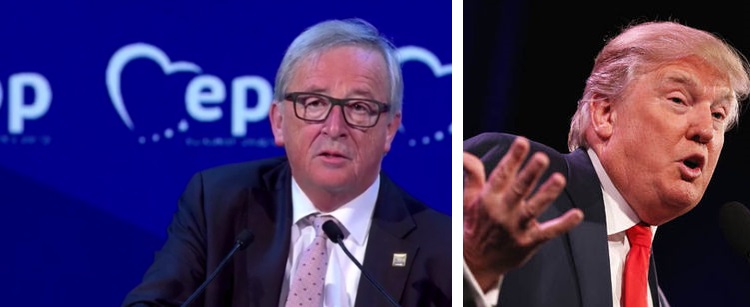Washington and Brussels are already at loggerheads over NATO funding and Trump dealing directly with national governments instead of the EU superstate.
Speaking at the European People Party’s (EPP) annual conference in Malta on Thursday, Juncker’s outspoken remarks are likely to disturb some European leaders who seek better relations with the Trump administration.
His remarks came in the middle of an angry speech in which the top eurocrat lambasted critics of the EU Commission.
He said: “Brexit isn’t the end. A lot of people would like it that way, even people on another continent where the newly elected US President was happy that Brexit was taking place and has asked other countries to do the same. If he goes on like that, I am going to promote the independence of Ohio and Austin, Texas in the US.”
His comments come after US Vice-President Mike Pence’s visit to Brussels. Juncker did not criticise Britain in his latest speech but rather linked Brexit to president Trump. UK Prime Minister Theresa May triggered Article 50 of the EU Lisbon Treaty to start Brexit talks on March 29.
Last week the EU Commission President warned Pence that another war in could erupt in the Western Balkans if the EU collapses. He also urged President Trump against encouraging countries to follow the example of Brexit.
Brexit is already becoming a headache for London now that Scotland and Ireland want to remain part of the European Union, but it does not change the big divide that exists between the economically strong Germany and the weak periphery.
EU leaders have failed to calculate the economic pressure being exerted by Germany as well as the backlash against Merkel’s migrant policies, creating the current tensions.
It is not certain that the so-called “multi-speed” model where a core group of European countries that are developing faster, remain together with others which are developing at a slower pace, in the face of patriotic sentiment rising.
Last week the leaders of 27 EU member states signed a declaration of intent of the bloc’s position post-Brexit at a summit, devoted to the 60th anniversary of the Treaty of Rome, which founded the European Economic Community, the EU’s predecessor.
On March 11, European Council President Donald Tusk stressed the necessity to preserve unity in the context of the Brexit negotiations.
The Polish eurocrat said the issue of national sovereignty was “a view that is both foolish and dangerous” and that the EU guaranteed countries’ strength on the world’s stage.
He accused Dutch Geert Wilders and France’s Marine Le Pen, of promoting “organised hatred” with their proposals against open borders and immigration.













No comments.
By submitting a comment you grant Free West Media a perpetual license to reproduce your words and name/web site in attribution. Inappropriate and irrelevant comments will be removed at an admin’s discretion. Your email is used for verification purposes only, it will never be shared.